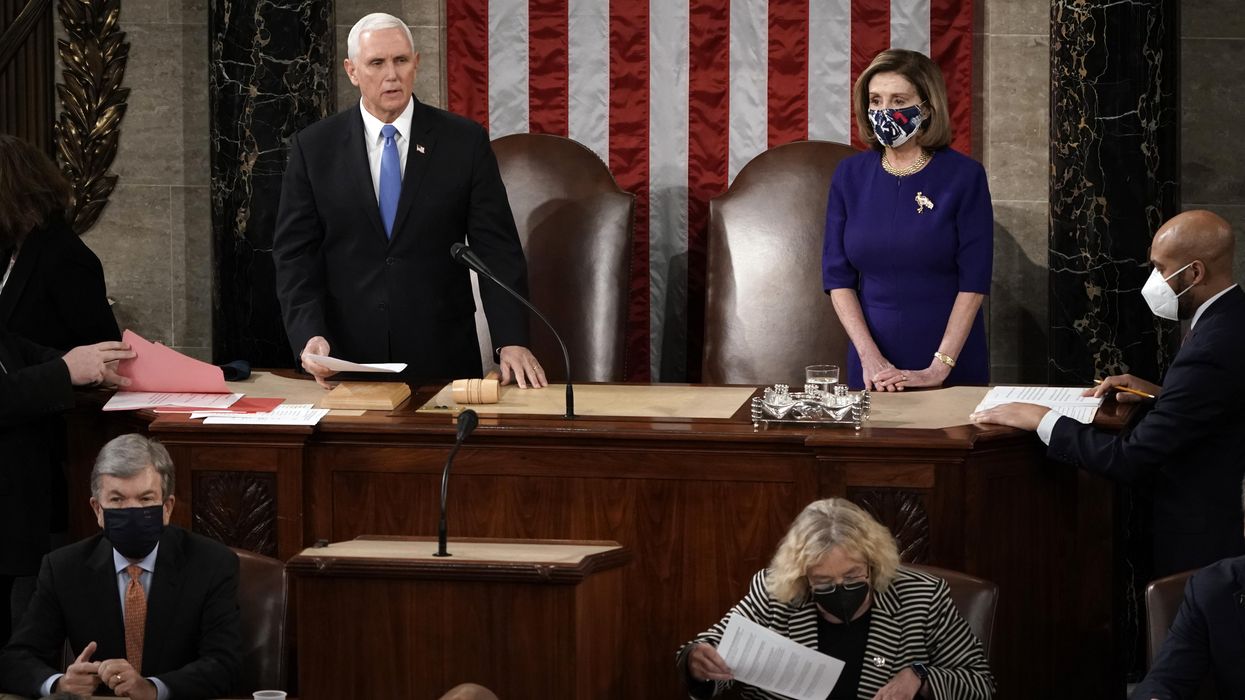To avoid a repeat of the Jan. 6 election insurrection, Congress needs to update a little-known law passed 134 years ago, experts say.
The Electoral Count Act of 1887 governs the casting and counting of electoral votes every four years, but the law's language is arcane and often confusing, which leaves room for misuse, according to the National Task Force on Election Crises. The cross-partisan group of more than 50 experts in election law, national security and voting rights released a reportTuesday renewing calls for swift congressional action to safeguard against potential future crises.
"Modernizing the ECA may well be the single most important thing that Congress can do to prevent a full-blown crisis in the next disputed presidential election," said Adav Noti, senior director for trial litigation and chief of staff at the Campaign Legal Center.
There are several deficiencies in the Electoral Count Act that experts say need to be rectified.
The timing for states to choose their electors, including the arcane rules for emergency, post-Election Day selection, should be clarified. "The current statute alludes vaguely to the possibility that a state's presidential election could result in 'failure,' but provides no definition or constraints, thus creating the potential for misunderstanding and even abuse," the report says.
The law should be reformed to better protect each state's ability to adjudicate its own post-election disputes and limit opportunities for second-guessing by partisan actors in Congress, the task force recommends.
The Electoral Count Act leaves too much room for uncertainty regarding the vice president's responsibilities, which are limited and ministerial, the report says. Before and on Jan. 6, there was speculation that the vice president had authority beyond opening envelopes and counting electoral votes. Therefore, the law should be updated to make clear the vice president "does not have the power to decide controversies that might arise over counting electoral votes or to otherwise decide the outcome of the election."
The threshold for raising objections to counting electoral votes should be raised well above the current requirement of only one member from each chamber, the report says. Also, the grounds upon which members of Congress may base objections should be narrowly defined so that lawmakers "may not simply substitute their own political preferences for the voters' judgment expressed at the ballot box and carried out by the Electoral College."
Finally, the law should be updated to establish procedures for resolving election disputes in Congress. The current mechanism is "convoluted and insufficient," the report says, because it details extensive procedures for Congress to follow but fails to provide a clear path to final resolution in many circumstances.
While these proposed reforms to the Electoral Count Act may sound small and technical, they could significantly bolster American democracy by ensuring a peaceful transition of power.
"Democracies today don't die through coups or wars," said Rachel Kleinfeld, a senior fellow in the Democracy, Conflict and Governance Program at the Carnegie Endowment for International Peace. "The way that most democracies right now are failing is [...] by elected leaders with undemocratic tendencies altering the rules of the game."
For the last 15 years, there has been a steady decline in democracies globally — and the U.S. is no exception, said Kleinfeld, who is also a member of the task force. So it's not a question of if these problems will happen, but when, she added.
Jan. 6 is the latest and worst example to date of an attack on American democracy, but there have been regular abuses of the Electoral Count Act for the last two decades, Noti said. And they've been getting progressively worse.
"This is not the area to wait for something to break and fix it after," said Noti, who like Kleinfeld is a member of the task force. "If this breaks and we go down the nightmare road of a truly unresolved presidential election — imagine dueling inaugurations on Inauguration Day. Imagine the chaos and violence that could ensue. That's too late at that point."
Experts say now is the best time to reform the Electoral Count Act since the 2024 election is still years away and neither party can predictably benefit from modernizing the law.
Former Rep. Zach Wamp of Tennessee, a Republican who co-chairs Issue One's Reformers Caucus, said he has had conversations with current members of Congress about updating the Electoral Count Act and he believes both parties can come together on this issue.
"We are all Americans first. Our parties come way down the list. Too many people have made party politics their religion, and that is now interfering in civil government and the continuity of this democratic republic," Wamp said. "[Reforming the law] has nothing to do with a partisan advantage or disadvantage."
At the end of January, the task force released its initial post-election report detailing the lessons learned from the 2020 contest and recommendations for how to improve future elections. Then in July, the task force issued an update outlining "concerning trends" that had developed over the last six months, including legislation that limits voter access and threats of violence against election workers.




















Marco Rubio is the only adult left in the room